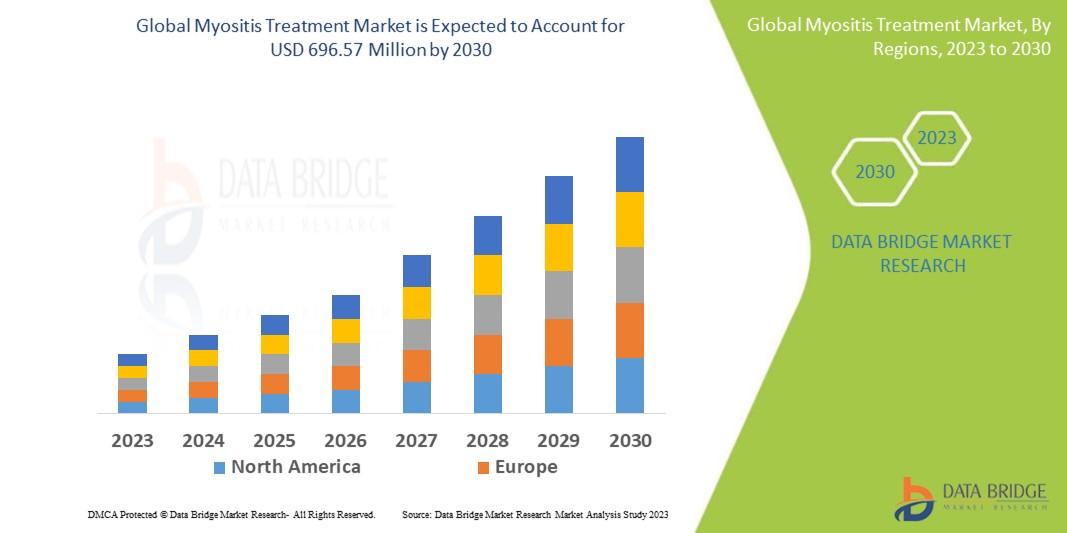Executive Summary Myositis Treatment Market :
Data Bridge Market Research analyses that the myositis treatment market, which was USD 493.15 million in 2022, would rocket up to USD 696.57 million by 2030 and is expected to undergo a CAGR of 4.4% during the forecast period of 2023 to 2030.
The transparent, trustworthy and extensive market information and data included in this Myositis Treatment Market business report will definitely help develop business and improve return on investment (ROI). The market report estimates the region that is foretold to create the most number of opportunities in the global Myositis Treatment Market. It figures out whether there will be any changes in market competition during the forecast period. These insights are often critical to key business processes such as product planning, new product development, distribution route planning and sales force development. The report really serves to be a proven solution for businesses to gain a competitive advantage.
With this Myositis Treatment Market report you can focus on the data and realities of the industry which keeps your business on the right path. To understand the competitive landscape in the market, an analysis of Porter’s five forces model for the market has also been included. The data and information collected to generate this top-quality market report has been derived from the trusted sources such as company websites, white papers, journals, and mergers etc. The Myositis Treatment Market research report acts as a strong backbone for industry with which it can outdo the competition.
Discover the latest trends, growth opportunities, and strategic insights in our comprehensive Myositis Treatment Market report. Download Full Report: https://www.databridgemarketresearch.com/reports/global-myositis-treatment-market
Myositis Treatment Market Overview
**Segments**
- By Type (Dermatomyositis, Polymyositis, Inclusion Body Myositis, Juvenile Myositis)
- By Drug Type (Corticosteroids, Disease-Modifying Antirheumatic Drugs (DMARDs), Immunosuppressants, Biologics, Others)
- By Distribution Channel (Hospital Pharmacies, Retail Pharmacies, Online Pharmacies)
- By End-Users (Hospitals, Specialty Clinics, Home Healthcare, Others)
Myositis is a rare autoimmune disease impacting muscle health, with various subtypes that can affect individuals of different age groups. In terms of types, the market is segmented into dermatomyositis, polymyositis, inclusion body myositis, and juvenile myositis. Each subtype comes with its own set of challenges and treatment approaches, contributing to the complexity of managing myositis. The drug types segment includes corticosteroids, disease-modifying antirheumatic drugs (DMARDs), immunosuppressants, biologics, and other medications. Depending on the severity and progression of the disease, healthcare providers may prescribe a combination of these drugs to alleviate symptoms and slow down disease progression. Distribution channels play a crucial role in ensuring timely access to medications, with hospital pharmacies, retail pharmacies, and online pharmacies being the key channels through which myositis treatments reach patients. End-users of myositis treatments include hospitals, specialty clinics, home healthcare services, and other healthcare facilities where patients receive ongoing care and support for managing their condition.
**Market Players**
- Pfizer Inc.
- Novartis AG
- F. Hoffmann-La Roche Ltd
- Regeneron Pharmaceuticals, Inc.
- Bristol-Myers Squibb Company
- Johnson & Johnson Services, Inc.
- AbbVie Inc.
- Merck & Co., Inc.
- Genentech, Inc.
- Amgen Inc.
In the global myositis treatment market, several key players dominate the competitive landscape by offering a range of medications and therapies aimed at addressing the complex needs of patients with myositis. Companies such as Pfizer Inc., Novartis AG, F. Hoffmann-La Roche Ltd, and Regeneron Pharmaceuticals, Inc. are at the forefront of research and development in this field, continuously innovating to enhance the efficacy and safety of treatments for myositis. Collaboration with healthcare providers and patient advocacy groups is essential for raising awareness about myositis and ensuring that new treatment options are readily available to those in need. The market players mentioned above, along with other pharmaceutical giants like Bristol-Myers Squibb Company, Johnson & Johnson Services, Inc., AbbVie Inc., Merck & Co., Inc., Genentech, Inc., and Amgen Inc., play a vital role in shaping the future of myositis treatment through their ongoing commitment to improving patient outcomes and quality of life.
The global myositis treatment market is witnessing significant growth driven by the increasing prevalence of autoimmune diseases and the rising demand for advanced treatment options. With a focus on improving patient outcomes and quality of life, market players are investing heavily in research and development to innovate new therapies and medications for myositis management. Collaborative efforts between pharmaceutical companies, healthcare providers, and patient advocacy groups are crucial for raising awareness about myositis, ensuring timely diagnosis, and improving access to effective treatments. The development of personalized treatment approaches tailored to individual patient needs is gaining traction in the market, offering hope for better outcomes and enhanced disease management.
One key trend shaping the myositis treatment market is the growing utilization of biologics as a promising therapy option for managing autoimmune diseases like myositis. Biologics target specific components of the immune system involved in the disease process, offering a more targeted and effective treatment approach compared to traditional medications. The introduction of novel biologic agents with improved efficacy and safety profiles is expected to drive market growth and widen treatment options for patients with myositis. Companies are also exploring combination therapies involving biologics and other drug types to address the complex nature of myositis and improve patient response rates.
Another significant factor influencing the market dynamics is the increasing adoption of telemedicine and remote monitoring services for myositis management. Telemedicine allows healthcare providers to remotely assess patient symptoms, monitor disease progression, and adjust treatment plans as needed, providing convenience and accessibility for patients, especially those in remote locations. The integration of digital health technologies and data analytics into myositis care pathways enables more personalized and proactive disease management, leading to better outcomes and improved patient satisfaction. Market players are investing in digital health solutions to enhance patient engagement, optimize treatment adherence, and streamline healthcare delivery for individuals with myositis.
Furthermore, the emphasis on patient-centric care and holistic disease management approaches is driving the market towards a more comprehensive and integrated care model for myositis. Multidisciplinary care teams comprising rheumatologists, neurologists, physical therapists, and other healthcare professionals collaborate to provide comprehensive care plans that address not only the physical symptoms but also the psychological and social aspects of living with myositis. This holistic approach aims to improve overall patient well-being, quality of life, and treatment outcomes, reflecting a shift towards more patient-centered healthcare delivery in the myositis treatment landscape. The integration of patient-reported outcomes and real-world evidence into clinical decision-making further empowers patients to actively participate in their care and contribute valuable insights to the treatment process.The global myositis treatment market is witnessing a notable shift towards personalized medicine, with a focus on developing tailored treatment approaches to meet the individual needs of patients with different subtypes of myositis. This trend is driven by the recognition that myositis is a complex autoimmune disease with varied clinical manifestations and responses to standard therapies. By catering to the specific characteristics of each myositis subtype, healthcare providers can optimize treatment outcomes and improve patient quality of life. Furthermore, the integration of patient-reported outcomes and real-world evidence into clinical decision-making processes enhances treatment efficacy by incorporating the valuable insights and perspectives of individuals living with myositis.
In addition, the increasing use of biologics in the management of myositis represents a significant advancement in treatment options for patients. Biologic therapies target key immune system mechanisms implicated in the pathogenesis of myositis, providing a more targeted and effective approach compared to traditional medications such as corticosteroids and immunosuppressants. The development of novel biologic agents with improved safety and efficacy profiles is expanding the treatment landscape for myositis, offering new hope for patients who may have experienced limited benefits from conventional therapies. As research in biologics continues to advance, market players are likely to invest further in innovative biologic treatments to address the unmet medical needs of individuals with myositis.
Moreover, the integration of telemedicine and remote monitoring services into myositis care pathways is transforming the delivery of healthcare services for patients with myositis. Telemedicine enables healthcare providers to remotely connect with patients, assess their symptoms, and adjust treatment plans as necessary, offering a convenient and accessible way for individuals to receive ongoing care, particularly those in remote or underserved areas. By leveraging digital health technologies and data analytics, healthcare professionals can create personalized care plans, monitor disease progression in real-time, and enhance patient adherence to treatment regimens. The adoption of telemedicine in myositis management not only improves patient engagement and satisfaction but also streamlines healthcare delivery, leading to better treatment outcomes and overall quality of care for individuals living with myositis.
In conclusion, the myositis treatment market continues to evolve with a focus on personalized medicine, biologic therapeutics, and digital health solutions to enhance patient outcomes and quality of life. The collaborative efforts of key market players, healthcare providers, and patient advocacy groups are instrumental in driving innovation, raising awareness, and improving access to effective treatments for individuals with myositis. By adopting a holistic and patient-centric approach to care, the myositis treatment landscape is poised to undergo significant advancements, offering new hope and improved quality of life for patients affected by this challenging autoimmune condition.
The Myositis Treatment Market is highly fragmented, featuring intense competition among both global and regional players striving for market share. To explore how global trends are shaping the future of the top 10 companies in the keyword market.
Learn More Now: https://www.databridgemarketresearch.com/reports/global-myositis-treatment-market/companies
DBMR Nucleus: Powering Insights, Strategy & Growth
DBMR Nucleus is a dynamic, AI-powered business intelligence platform designed to revolutionize the way organizations access and interpret market data. Developed by Data Bridge Market Research, Nucleus integrates cutting-edge analytics with intuitive dashboards to deliver real-time insights across industries. From tracking market trends and competitive landscapes to uncovering growth opportunities, the platform enables strategic decision-making backed by data-driven evidence. Whether you're a startup or an enterprise, DBMR Nucleus equips you with the tools to stay ahead of the curve and fuel long-term success.
Key Coverage in the Myositis Treatment Market Report:
- Detailed analysis of Global Myositis Treatment Marketby a thorough assessment of the technology, product type, application, and other key segments of the report
- Qualitative and quantitative analysis of the market along with CAGR calculation for the forecast period
- Investigative study of the market dynamics including drivers, opportunities, restraints, and limitations that can influence the market growth
- Comprehensive analysis of the regions of the Myositis Treatment Marketand their futuristic growth outlook
- Competitive landscape benchmarking with key coverage of company profiles, product portfolio, and business expansion strategies
Browse More Reports:
Global Unijunction Transistor Market
Global Automotive Braking Systems Market
Global Okra Snacks Market
North America Aluminum Casting Market
Global Dairy Market
Middle East and Africa Silicon on Insulator Market
Global Focal Segmental Glomerulosclerosis Market
Global Hospital Staffing Market
Global Multiwall Bags Market
Global Concrete Cooling Market
Global Engineered Wood Packaging Market
Global Breastfeeding Accessories Market
Global Fencing Equipment Market
North America Modular Construction Market
Global Laptop Accessories Market
Global Independent Validation and Verification (IV and V) Testing Services Market
Global Waterproof Tapes Market
Global Cartesian Robots Market
Asia-Pacific Remote Sensing Technology Market
Global College and University Management Software Market
North America Heart Valve Repair and Replacement Market
Global Non-Thermal Processing For Food Market
Europe Gas Filtration Media Market
North America Surface Analysis Market
Global Alport Syndrome Market
Europe Antimicrobial Coatings Market
Global Heterogeneous Networks Market
Global Pasta Sauce Market
Global Chilled Beam System Market
Global Personal Transporter Market
Asia-Pacific Flow Chemistry Market
Middle East and Africa Elastomer Coated Fabrics Market
Global Berry-based Supplements Market
Global Automotive Push Rods Market
Global Dissolving Wood Pulp Market
Global Consumer Audio Market
About Data Bridge Market Research:
An absolute way to forecast what the future holds is to comprehend the trend today!
Data Bridge Market Research set forth itself as an unconventional and neoteric market research and consulting firm with an unparalleled level of resilience and integrated approaches. We are determined to unearth the best market opportunities and foster efficient information for your business to thrive in the market. Data Bridge endeavors to provide appropriate solutions to the complex business challenges and initiates an effortless decision-making process. Data Bridge is an aftermath of sheer wisdom and experience which was formulated and framed in the year 2015 in Pune.
Contact Us:
Data Bridge Market Research
US: +1 614 591 3140
UK: +44 845 154 9652
APAC : +653 1251 975
Email:- corporatesales@databridgemarketresearch.com



